5 Benefits of Conducting a Procurement Audit


If you’re part of a procurement team, welcome—because this article is tailor-made for you.
We understand the challenges you face every day: managing costs, preventing unauthorized spending, ensuring compliance with regulations, and holding team members accountable for their decisions.
But what if there was a solution to address all of these challenges head-on?
Spoiler alert: there is!
It’s called a procurement audit, and through the five benefits it brings, we will demonstrate how it can revolutionize your procurement department.
Buckle up, and let’s dive into the first benefit.
Procurement audits function as an X-ray vision for your procurement processes, uncovering hidden inefficiencies and bottlenecks that could be slowing you down.
In simple terms, procurement audits are regular checks conducted to ensure your procurement processes run smoothly and efficiently.
These audits help identify inefficiencies or discrepancies in your workflows, allowing you to address them on time.
Why is this important?
Well, by promptly identifying these issues, procurement audits empower you to implement improvements, ultimately leading to a more streamlined procurement process.
This translates to increased efficiency.
In other words, it saves valuable time and resources for both your team and the organization as a whole.
Now, let’s explore some examples of the bottlenecks and inefficiencies procurement audits can uncover, along with strategies to address them.
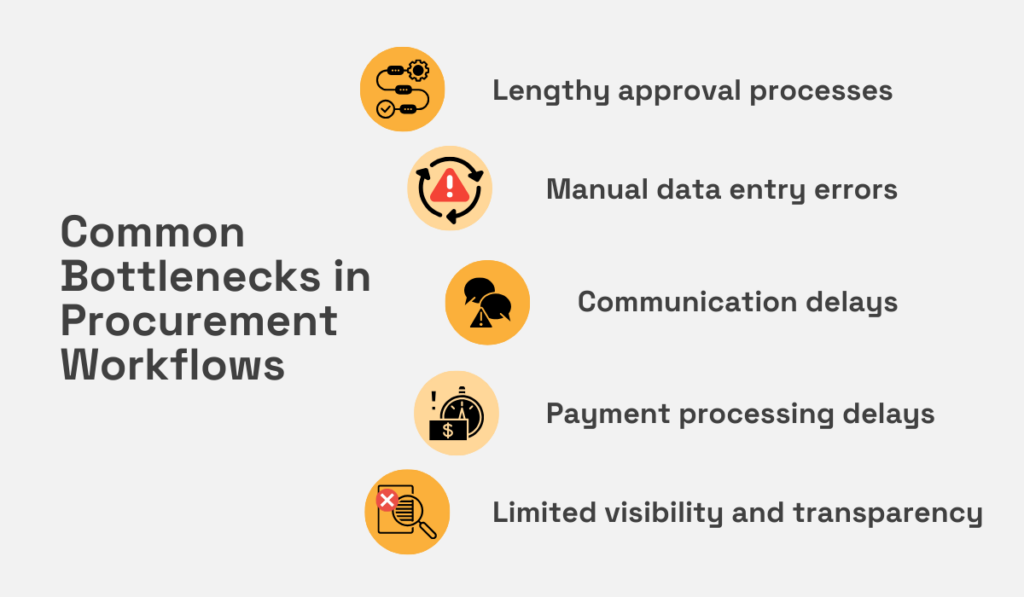
Source: Veridion
Let’s begin with lengthy approval workflows—a common concern for many.
During audits, detailed analysis of the approval workflow occurs, tracking the time taken at each stage and identifying any delays or bottlenecks.
By comparing actual approval times against predefined benchmarks, audits shed light on areas where approvals may be unnecessarily prolonged and reveal redundant steps or approvals.
You’re well aware that lengthy approvals for purchase requests can significantly hinder procurement cycles, delay the delivery of goods or services, or even result in undisbursed loans and missed opportunities.
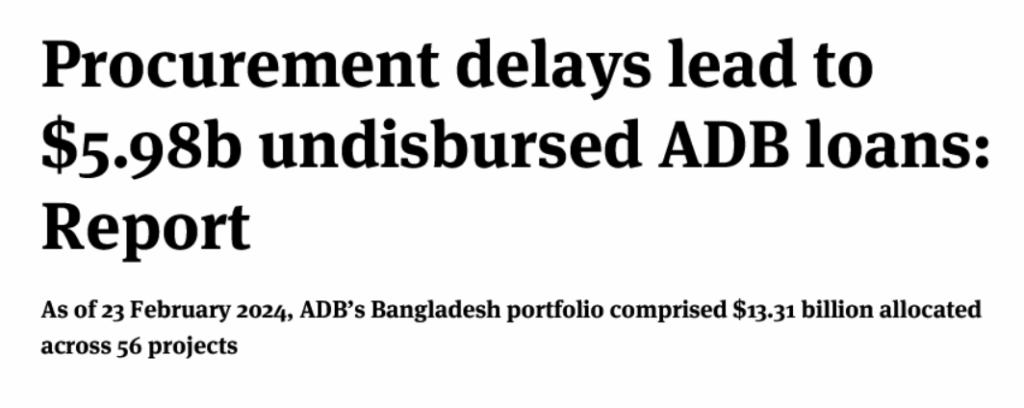
Source: TBS News
However, when you identify these bottlenecks through audits, you have the power to take proactive steps to improve and expedite procurement cycles.
For instance, establishing clear approval hierarchies, setting predefined approval thresholds, and utilizing procurement software for real-time approvals visible to all stakeholders can help streamline the process.
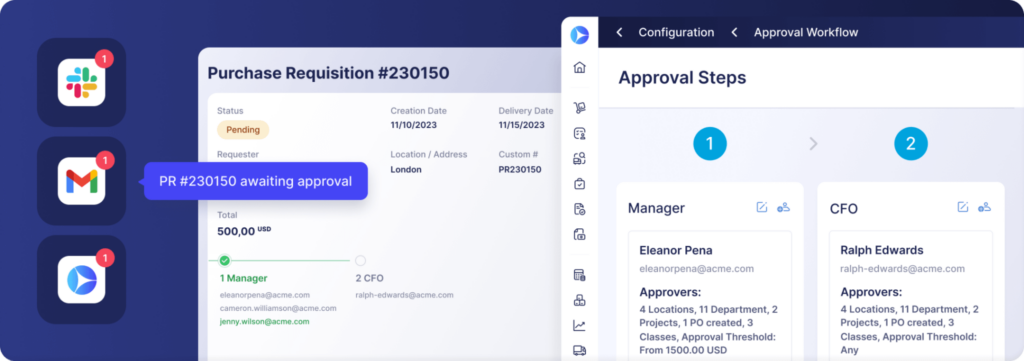
Source: Precoro
Procurement audits may also uncover inaccuracies in manually entered data, resulting in errors in purchase orders, invoices, and inventory records.
This could prompt you to consider implementing automation tools with automated data entry processes or software with built-in validation checks to ensure accuracy.
In fact, audits may encourage you to utilize technology solutions like procurement software with workflow automation capabilities, electronic document management systems, or supplier portals.
All these tools can further streamline communication, automate routine tasks, and expedite procurement processes.
But, as we mentioned, you first need to conduct a procurement audit to identify the bottlenecks in your procurement workflows to streamline your procurement and make it truly efficient.
Apart from being X-ray vision, procurement audits also take on the role of a compass that helps you navigate spending much better.
So, when discussing the benefits of procurement audits, it’s essential to understand their role in ensuring efficient and responsible use of funds.
Take, for example, the case of Services Australia, where office furniture purchases totaling $180 million over five years were made without proper scrutiny.
These purchases often involved only one supplier without comparing prices with other options.
Additionally, some purchases were inaccurately reported, and contracts were even signed before decisions were made on what to buy.
This lack of oversight and accountability led to waste and inefficiency in spending.

Source: Riotact
By contrast, with procurement audits in place, organizations can identify and rectify such issues, ensuring that funds are spent wisely and transparently.
Through thorough examination and analysis, procurement audits help optimize spending practices, promote competition among suppliers, and uphold accountability in financial management.
Ultimately, procurement audits are critical for safeguarding your organization’s money (as well as taxpayer dollars, as in the example above) and achieving value for money in procurement processes.
Let’s explore how they do it.
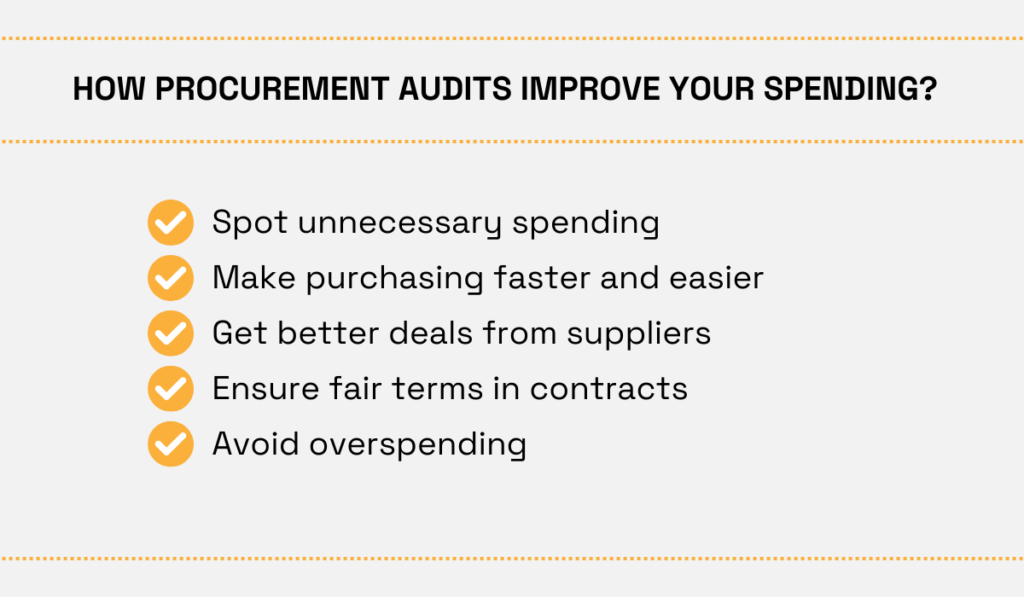
Source: Veridion
Firstly, one of the purposes of a procurement audit is to scrutinize your procurement practices to identify non-compliance, maverick spending, or other inefficiencies.
Identifying and addressing these issues allows you to align purchases with established policies, as well as ensure there is no spending outside of contracts, which usually involves higher costs and more risks.
During audits, supplier relationships are evaluated, which also empowers you to better manage spend.
For instance, if you identify suppliers who consistently provide quality products or services at competitive prices, you can leverage this information to negotiate volume discounts or more favorable payment terms.
Ultimately, this leads to cost savings and better spending practices.
On the other hand, audits can reveal suppliers who do not adhere to contractual obligations.
In such cases, you can take steps to either renegotiate terms with these suppliers to ensure compliance or seek alternative vendors who can fulfill contractual obligations.
This ensures that funds are spent with suppliers who demonstrate accountability and reliability, which also contributes to better spending practices and ultimately enhances your financial management.
Lastly, the sole analysis of spending patterns and data reveals overspending, cost-saving opportunities, and budget deviations.
The insights gained can help you optimize spending, reallocate resources more effectively, and ensure budgetary compliance.
All of these factors foster more prudent financial management of procurement departments.
Procurement audits are instrumental in fostering accountability among the staff involved in procurement activities.
Through a comprehensive evaluation of adherence to your procurement policies, procedures, and controls, audits are a mechanism for holding your employees accountable for their actions and decisions.
By scrutinizing every aspect of the procurement process, from request initiation to vendor selection and contract management, audits check if your employees follow established protocols and guidelines.
When these protocols are not followed, situations like the one involving the Malaysian Ministry of Health (MOH) and Pharmaniaga Logistics are bound to happen:

Source: Code Blue
In this case, the absence of a written contract between the buyer and Pharmaniaga Logistics left no one accountable for the malfunction of 104 ventilator units procured during the COVID-19 pandemic.
This lack of accountability hindered legal action and resulted in significant financial losses for the government.
Such incidents underscore the need for robust oversight and adherence to established procurement procedures—as well as regular internal audits.
With regular procurement audits in place, employees are encouraged to act responsibly.
Knowing that what they do will be subject to regular reviews motivates them to follow procedures and avoid shortcuts or deviations that could compromise the integrity of the procurement process.
On top of that, it can put their job and their integrity in danger.
In addition to promoting adherence to policies and procedures, audits also uphold ethical standards in your procurement activities.
By detecting and preventing fraudulent activities, conflicts of interest, or other unethical practices, audits reinforce your organization’s commitment to integrity and transparency.
This, in turn, helps foster a culture of trust and accountability within your procurement team and your organization as a whole.
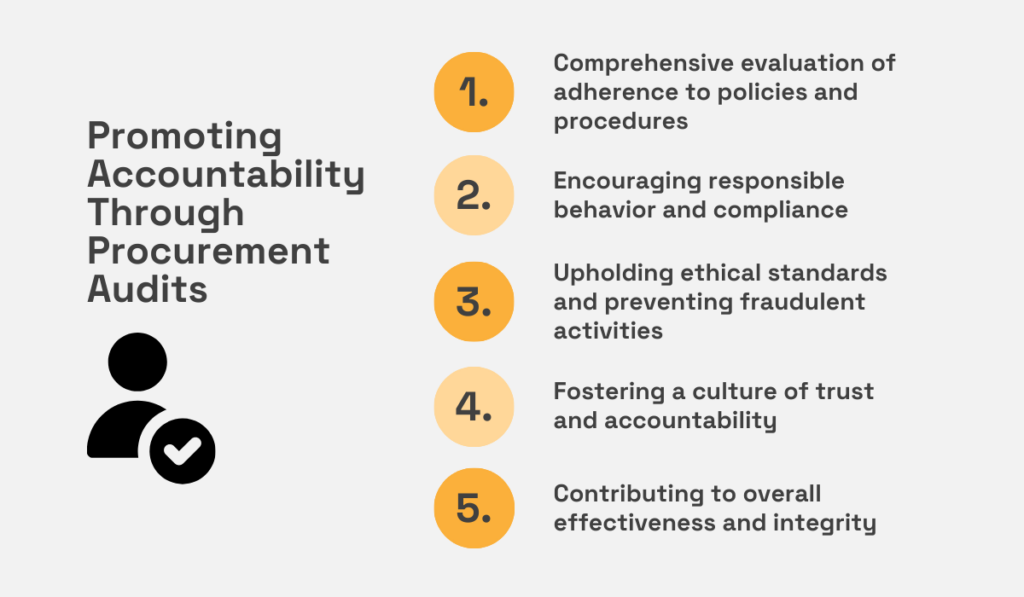
Source: Veridion
In summary, procurement audits are powerful tools for promoting accountability across departments involved in procurement activities.
They encourage responsible behavior, ensure compliance with organizational guidelines, and contribute to the overall effectiveness and integrity of the procurement function.
In the complex landscape of business transactions, the allure of fraudulent activities often lurks where financial interests intersect.
A recent global study highlights the prevalence of such risks, with alarming statistics revealing incidents of fraud involving employees, suppliers, and even collusion among them.
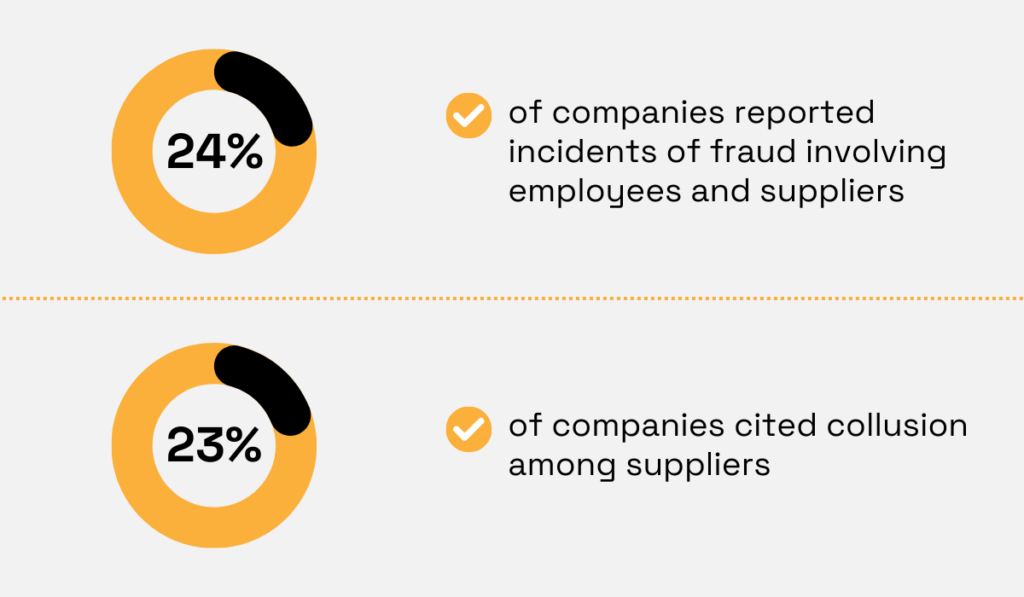
Illustration: Veridion / Data: Sas
Among the favored targets for fraudsters, invoicing practices top the list, closely followed by contract bid rigging.
However, there’s a silver lining amidst these challenges—procurement audits.
They protect against fraudulent activities within organizations, offering a sturdy defense against financial losses and reputational damage.
But how exactly do they achieve this?
As we made clear by now, procurement audits involve a detailed examination of procurement processes, documentation, and transactions.
By analyzing various data points, audits can discover inconsistencies, irregularities, or suspicious patterns that may signal fraudulent activities.
These red flags could include:
Moreover, an essential part of procurement audits is vetting the legitimacy of vendors and suppliers used by the organization.
This includes confirming vendor existence, validating credentials, and assessing their reputation and reliability.
At this point in audits, it’s wise to use the freshest data on suppliers.
Our big data platform, Veridion, for instance, provides up-to-date information on tens of millions of global suppliers, making it your go-to tool for vetting suppliers.
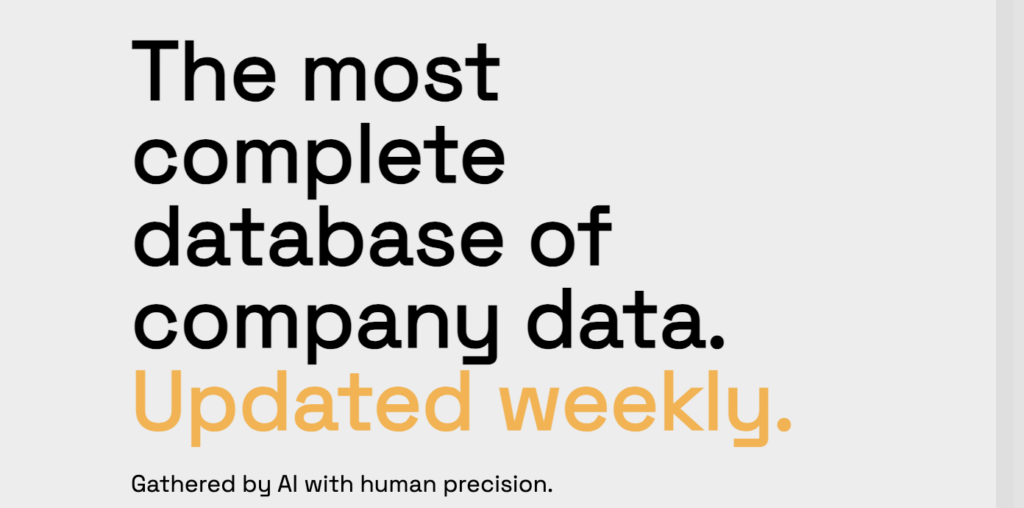
Source: Veridion
By scrutinizing vendor information and conducting background checks, audits can expose instances of fictitious vendors or collusion between employees and vendors to perpetrate fraud.
Furthermore, audits delve into invoices, purchase orders, and payment records to ensure accuracy and legitimacy.
Discrepancies such as duplicate invoices, inflated prices, or payments to unauthorized vendors can indicate fraudulent activities like billing schemes or kickbacks.
Additionally, audits scrutinize compliance with contract terms and conditions to prevent contract fraud.
This involves verifying that delivered goods or services align with contract specifications, adhere to pricing agreements, and confirm the authenticity of contract amendments or modifications.
Audits also evaluate the effectiveness of internal controls and safeguards intended to prevent and detect fraud.
This includes reviewing the segregation of duties, authorization processes, access controls, and oversight mechanisms.
In essence, procurement audits are indispensable for detecting fraud.
They scrutinize procurement processes from A to Z, including vendor relationships, financial transactions, contract compliance, and internal controls.
When you regularly audit your procurement on all of the above points, you can quickly identify deficiencies, take corrective action, recover losses, and implement controls to prevent future incidents.
Procurement operations face a myriad of risks beyond just fraud.
Fortunately, procurement audits can help you identify and mitigate these risks.
These audits thoroughly examine various aspects of procurement, including:
When it comes to supplier performance, audits provide valuable insights into the reliability, quality-focus, and responsiveness of your suppliers.
By pinpointing any weaknesses, you’re empowered to take corrective actions and reduce risks associated with unreliable or underperforming suppliers.
Furthermore, audits scrutinize contract terms and conditions, ensuring they align with legal requirements, your organization’s policies, and industry standards.
By confirming the accuracy and completeness of contracts, you can mitigate risks related to disputes, breaches, or non-compliance.
Analyzing transactional data is another critical aspect of procurement audits.
By examining spending patterns, payment procedures, and transactional irregularities, audits help uncover potential fraud or financial misconduct.
Strengthening internal controls and taking preventive actions based on audit findings can reduce the likelihood of fraud, financial loss, and reputational damage.
In addition to these internal measures, recent developments in industries such as pharmaceuticals highlight the importance of regular audits in mitigating risks throughout the supply chain.
For example, India is considering implementing annual audits of raw material suppliers by drugmakers, replacing existing self-inspection practices.

Source: The Hindu
This shift towards more rigorous auditing practices reflects a growing recognition of the role audits play in ensuring supplier compliance with quality standards and regulatory requirements.
By conducting such regular supplier audits, organizations can identify and address potential risks associated with raw material quality, compliance issues, and supply chain disruptions.
These can safeguard product quality, maintain regulatory compliance, and protect the reputation of organizations in the face of evolving industry standards and regulatory expectations.
In summary, by addressing vulnerabilities, evaluating performance, and taking corrective measures, audits help protect your interests, shield against potential threats, and maintain the integrity and efficiency of your procurement operations.
In conclusion, procurement audits aren’t just routine tasks but potent instruments for mitigating risks and refining your processes.
By scrutinizing vendor relationships, contract management practices, and transactional data, you can streamline processes, tackle risks, and curb the likelihood of fraud, financial loss, and reputational harm, all while ensuring the integrity and efficiency of procurement operations.
Procurement audits also strengthen accountability, improve decision-making, and shield you against potential threats.
So, the bottom line is crystal clear: implementing procurement audits means investing in your organization’s long-term prosperity.